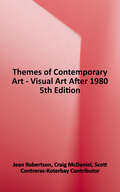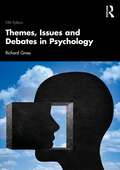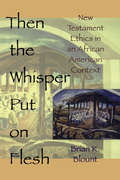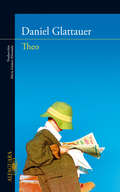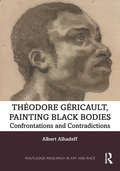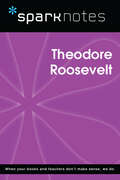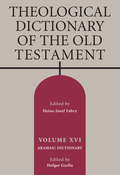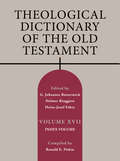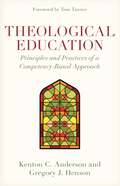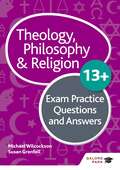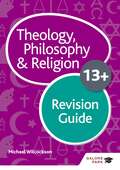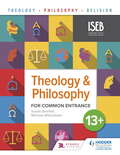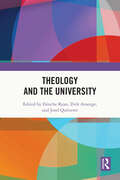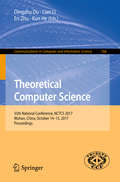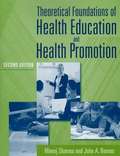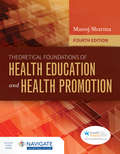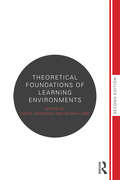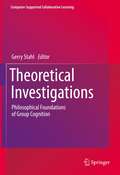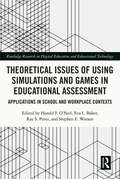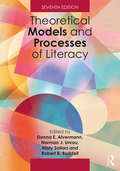- Table View
- List View
Themes of Contemporary Art: Visual Art After 1980, 5th Edition
by Jean Robertson Craig McDanielThis book offers students and readers an introduction to recent art. The primary focus is an examination of themes that are widespread in contemporary artistic practice. Individual chapters analyze thematic content in eight groupings: Identity, The Body, Time, Memory, Place, Language, Science, and Spirituality. These eight thematic categories provide a significant sample from which readers can grasp influential concepts that stretch across much of the art of our time. Profiles of key artists and works enhance students' understanding of these major themes and the individual approaches and key movements in the world of contemporary art.
Themes, Issues and Debates in Psychology
by Richard GrossThemes, Issues and Debates in Psychology presents an integrated view of Psychology by identifying underlying themes (such as the scientific nature of Psychology, cultural and gender differences), issues (ethical, methodological and conceptual), and debates (such as heredity vs. environment, free will vs. determinism, normality vs. abnormality) which permeate the discipline as a whole. The text adopts a critical approach to ‘mainstream Psychology’, attempting to identify and challenge some of the underlying assumptions that are traditionally made about ‘human nature’ and how it can be investigated in ways based on the scientific study of the natural world. What makes Psychology unique is the view of Psychologists as part of their own subject-matter: trying to study other people cannot be done by copying the methods of the physicist or chemist. Psychology draws on and brings together a number of different theories and methodologies from a wide range of other disciplines, including philosophy, biology, anthropology and sociology. Themes, Issues and Debates in Psychology also includes chapters on Parapsychology, Positive Psychology and Religion and Spirituality, which are rarely found together in a single text. Not only are these not mainstream, but they highlight some of the themes, issues and debates discussed in earlier chapters. The topics in this fifth edition of this book are inflected by a new concern with decolonizing the curriculum, and discussions of cultural and gender-based issues are integrated into all aspects of the text to offer a new and critical perspective on issues such as political and scientific colonialism. Additionally, the text features ‘Question Time’ breaks that relate to methodological, theoretical and other issues; these are all aimed at helping the reader assimilate the material. Some of the issues raised could form the basis of seminar papers/discussions. Themes, Issues and Debates in Psychology is ideal reading for all students and is relevant to undergraduate courses in psychology.
Then the Whisper Put On Flesh: New Testament Ethics in an African American Context
by Brian K. BlountDevastating circumstances still enslave most African Americans in American society today, especially in urban environments. They struggle with economic devastation, family disintegration, black-on-black crime, unemployment, political and social injustice, as well as the structural racism that fuels all of these. In the midst of this horrible din, there is a whisper from the Lord, a faith statement upon which there can be established an ethic of transformation for an oppressed African American Christian community. The whispers of faith, hope, and ethical direction that flow out of the New Testament materials have always taken their fleshly shape in light of the context in which African Americans have found themselves. Blount studies selected New Testament texts and evaluates them in light of their first-century contexts, primarily from a socio-linguistic perspective, and then reads them through the eyes of the contemporary African American Christian. This study analyzes the differences between the first century context, which prompted the biblical writers to reflect ethically upon their faith statements as they did, and the present reality of African Americans in the United States, which motivates their Christian leaders to reflect upon these same statements in such radically different ways. An example of a twentieth-century ethical situation is Martin Luther King, Jr.'s campaign of civil disobedience which appeared to be in direct contradiction to the ethical prescriptions in Romans 113 and 1 Peter 2:13-17, which mandate unqualified Christian obedience of government. Blount urges African American Christians to continually reevaluate the ethical principles established for first-century biblical communities in light of the novel circumstances that prevail today. In so doing, African Americans will be giving flesh to the inspirational whisper of the New Testament.
Theo: Respuestas desde la habitación infantil
by Daniel GlattauerUn libro divertido, lleno de sensibilidad y de emociones que llegan al corazón del lector. Theo es el sobrino del autor de bestsellers Daniel Glattauer. Cuando nació, su tío tomó la determinación de observar y describir cómo iba creciendo ese pequeño ser. A Theo le gustó la idea y colaboró aplicadamente en el proyecto. Solo tenía tres años cuando concedió su primera entrevista en exclusiva. Tras esta experiencia, pronto se hizo patente que su afán por comunicar no había quedado satisfecho ni de lejos; las vivencias de Theo ya eran demasiadas como para privar de ellas a la opinión pública: sus primeros huevos de Pascua, el fenómeno del teléfono, la primera visita al parque de atracciones de Viena, animales que flotan en el agua (peces) y, algo especialmente maravilloso, la época prenavideña en el supermercado. Paso a paso, Theo va conquistando el mundo de los adultos a su manera.
Theodore Gericault, Painting Black Bodies: Confrontations and Contradictions (Routledge Research in Art and Race)
by Albert AlhadeffThis book examines Théodore Géricault’s images of black men, women and children who suffered slavery’s trans-Atlantic passage in the late eighteenth and early nineteenth centuries, including his 1819 painting The Raft of the Medusa. The book focuses on Géricault’s depiction of black people, his approach towards slavery, and the voices that advanced or denigrated them. By turning to documents, essays and critiques, both before and after Waterloo (1815), and, most importantly, Géricault’s own oeuvre, this study explores the fetters of slavery that Gericault challenged—alongside a growing number of abolitionists—overtly or covertly. This book will be of interest to scholars in art history, race and ethnic studies and students of modernism.
Theodore Roosevelt (SparkNotes Biography Guide)
by SparkNotesTheodore Roosevelt (SparkNotes Biography Guide) Making the reading experience fun! SparkNotes Biography Guides examine the lives of historical luminaries, from Alexander the Great to Virginia Woolf. Each biography guide includes:An examination of the historical context in which the person lived A summary of the person&’s life and achievements A glossary of important terms, people, and events An in-depth look at the key epochs in the person&’s career Study questions and essay topics A review test Suggestions for further reading Whether you&’re a student of history or just a student cramming for a history exam, SparkNotes Biography guides are a reliable, thorough, and readable resource.
Theological Dictionary of the Old Testament, Volume XVI (Theological Dictionary Of The Old Testament Ser. #11)
by G. Johannes Botterweck; Helmer Ringgren; Heinz-Josef FabryVolume XVI concludes the monumental, critically acclaimed Theological Dictionary of the Old Testament with an Aramaic dictionary.This latest and last TDOT volume incorporates nearly the complete lexicon of Biblical Aramaic as well as a major portion of the theologically, culturally, and historically relevant terms in other ancient Aramaic writings. Each article provides information on the term&’s meaning and usage, is fully annotated, and contains a bibliography with cross-references to the entire TDOT series.Further enhancing this volume are an introductory overview of the history of Aramaic and a comparative grammatical outline of ancient Aramaic at the end of the book.
Theological Dictionary of the Old Testament, Volume XVI (Theological Dictionary Of The Old Testament Ser. #14)
by G. Johannes Botterweck; Helmer Ringgren; Heinz-Josef FabryVolume XVI concludes the monumental, critically acclaimed Theological Dictionary of the Old Testament with an Aramaic dictionary.This latest and last TDOT volume incorporates nearly the complete lexicon of Biblical Aramaic as well as a major portion of the theologically, culturally, and historically relevant terms in other ancient Aramaic writings. Each article provides information on the term&’s meaning and usage, is fully annotated, and contains a bibliography with cross-references to the entire TDOT series.Further enhancing this volume are an introductory overview of the history of Aramaic and a comparative grammatical outline of ancient Aramaic at the end of the book.
Theological Dictionary of the Old Testament, Volume XVII: Index Volume (Theological Dictionary of the Old Testament)
by Ronald E. PitkinThis useful resource, which concludes the illustrious Theological Dictionary of the Old Testament, provides TDOT users with an index to all sixteen previous volumes. The first part of this volume indexes keywords in Hebrew, Aramaic, and English, while the second part indexes all textual references—both biblical and extrabiblical.
Theological Education: Principles and Practices of a Competency-Based Approach
by Kenton C. Anderson Gregory J. HensonTheological Education demonstrates how churches and seminaries can cooperate through a competency-based learning approach to ministry preparation--that is, competency-based theological education (CBTE). CBTE focuses on the mutual mission of the church and theological education: developing followers of Christ who flourish in their vocations. This first book-length treatment of CBTE lays the groundwork for expansion and refinement as theological schools and churches move together in partnership, exploring: - Principles that ground successful CBTE cooperation, such as collaborative mission, contextualized discipleship, and holistic assessment; and - Practices that a CBTE approach requires, such as affordable programs, flexible technology, and continuous improvement Using the CBTE model means seminaries can provide practical ministry training together with churches who invest in the theological education of those who minister among them.
Theology Philosophy and Religion 13+ Exam Practice Questions and Answers
by Michael Wilcockson Susan GrenfellThis book contains a wealth of exam-style questions to help students prepare for the 13+ Common Entrance exam in Theology, Philosophy and Religion. Tailored specifically to the latest syllabus, all question come with detailed advice and model answers that enable pupils to grow in confidence and achieve top marks.- Endorsed by ISEB- Covers all three question types that could appear in the exam- Contains model answers to all questions, saving time and helping to identify areas requiring further study- Includes the ISEB Common Entrance mark scheme
Theology Philosophy and Religion 13+ Exam Practice Questions and Answers
by Michael Wilcockson Susan GrenfellThis book contains a wealth of exam-style questions to help students prepare for the 13+ Common Entrance exam in Theology, Philosophy and Religion. Tailored specifically to the latest syllabus, all question come with detailed advice and model answers that enable pupils to grow in confidence and achieve top marks.- Endorsed by ISEB- Covers all three question types that could appear in the exam- Contains model answers to all questions, saving time and helping to identify areas requiring further study- Includes the ISEB Common Entrance mark scheme
Theology Philosophy and Religion for 13+ Revision Guide
by Michael WilcocksonThis indispensable revision guide is mapped precisely to the new Theology, Philosophy and Religion syllabus for 13+ Common Entrance, and provides students with a concise summary of everything they need to know for the latest exam beginning autumn 2019. Endorsed by ISEB, it covers all key content in an accessible format and includes test-yourself questions that embed knowledge as students work through the book.- Endorsed by ISEB- Summarises the key content for the new Theology, Philosophy and Religion syllabus replacing Religious Studies A- Guided activities and test-yourself questions enable pupils to recall knowledge and build exam-room confidence- Includes a handy glossary for easy reference throughout the book
Theology Philosophy and Religion for 13+ Revision Guide
by Michael WilcocksonThis indispensable revision guide is mapped precisely to the new Theology, Philosophy and Religion syllabus for 13+ Common Entrance, and provides students with a concise summary of everything they need to know for the latest exam beginning autumn 2019. Endorsed by ISEB, it covers all key content in an accessible format and includes test-yourself questions that embed knowledge as students work through the book.- Endorsed by ISEB- Summarises the key content for the new Theology, Philosophy and Religion syllabus replacing Religious Studies A- Guided activities and test-yourself questions enable pupils to recall knowledge and build exam-room confidence- Includes a handy glossary for easy reference throughout the book
Theology and Philosophy for Common Entrance 13+
by Michael Wilcockson Susan GrenfellTrust the experts; let Religious Studies specialists Susan Grenfell and Michael Wilcockson guide you through the new Theology and Philosophy content of the ISEB Theology, Philosophy and Religion syllabus for Common Entrance 13+.- Enables students to develop and review their knowledge through discussion points and a variety of activities designed to encourage active research and engagement- Builds the skills that students need for the exam by providing questions that focus on the three assessment objectives- Boosts students' confidence approaching assessment with exam-style practice questions at the end of each section- Guides you though the new - and potentially challenging - syllabus content with clear coverage of the philosophical and ethical materialThis Student Book is fully supported by the accompanying Teacher Resource Book, which contains helpful Teachers' Overviews for each chapter, guidance on delivering the content and classroom-ready worksheets.
Theology and Philosophy for Common Entrance 13+
by Michael Wilcockson Susan GrenfellTrust the experts; let Religious Studies specialists Susan Grenfell and Michael Wilcockson guide you through the new Theology and Philosophy content of the ISEB Theology, Philosophy and Religion syllabus for Common Entrance 13+.- Enables students to develop and review their knowledge through discussion points and a variety of activities designed to encourage active research and engagement- Builds the skills that students need for the exam by providing questions that focus on the three assessment objectives- Boosts students' confidence approaching assessment with exam-style practice questions at the end of each section- Guides you though the new - and potentially challenging - syllabus content with clear coverage of the philosophical and ethical materialThis Student Book is fully supported by the accompanying Teacher Resource Book, which contains helpful Teachers' Overviews for each chapter, guidance on delivering the content and classroom-ready worksheets.
Theology and the University
by Fáinche Ryan Dirk Ansorge Josef QuittererTheology and the University presents a compelling argument as to why theology still matters. It considers how theology has been marginalised in the academy and in public life, arguing that doing so has serious repercussions for the integrity of the academic study of religion.The chapters in this book demonstrate how theology, as the only discipline which represents religion from within, provides insight into aspects of religion which are hidden from the social sciences. Against a backdrop of heated debates on the role of the humanities in the university, the book highlights the specific contribution of theological education and research to the work of a university, providing essential information for academic and social/political decision-making. Whilst the book has an emphasis on the Catholic tradition, it explores the prospect of fruitful complementarity and interdisciplinarity both with secularised studies of religion, and other disciplines in the university, such as literature, philosophy, and the social sciences.This book provides orientation for decision-makers, particularly those concerned with the broader question of humanities in the university; students in their choice of study; those interested in the wellbeing of today’s universities; and ecclesial authorities seeking to form leaders capable of intelligent responses to the issues of contemporary society. It is a must read for all researchers of theology, as well as anyone interested in the role of the humanities more broadly.
Theology of Hope: On the Ground and the Implications of a Christian Eschatology (The Works of Jurgen Moltmann)
by Jurgen Moltmann James W. LeitchThe following efforts bear the title Theology of Hope, not because they set out once again to present eschatology as a separate doctrine and to compete with the well known textbooks. Rather, their aim is to show how theology can set out from hope and begin to consider its theme in an eschatological light. <p><p>For this reason they inquire into the ground of the hope of Christian faith and into the responsible exercise of this hope in thought and action in the world today. The various critical discussions should not be understood as rejections and condemnations. They are necessary conversations on a common subject which is so rich that it demands continual new approaches.
Theoretical Computer Science
by Lian Li Dingzhu Du En Zhu Kun HeThe satisfiability (SAT) problem is central in mathematical logic, computing theory, and many industrial applications. There has been a strong relationship between the theory, the algorithms, and the applications of the SAT problem. This book aims to bring together work by the best theorists, algorithmists, and practitioners working on the SAT problem and on industrial applications, as well as to enhance the interaction between the three research groups. The book features the application of theoretical/algorithmic results to practical problems and presents practical problems for theoretical/algorithmic study. Major topics covered in the book include practical and industrial SAT problems and benchmarks, significant case studies and applications of the SAT problem and SAT algorithms, new algorithms and improved techniques for satisfiability testing, specific data structures and implementation details of the SAT algorithms, and the theoretical study of the SAT problem and SAT algorithms. It features: a comprehensive review of SAT research work over the past 25 years; the most recent research results; and a spectrum of algorithmic issues and applications.
Theoretical Foundations of Health Education and Health Promotion
by John A. Romas Manoj SharmaTheoretical Foundations of Health Education and Health Promotion, Second Edition, introduces students to common theories from behavioral and social sciences that are currently being used in health education and promotion. Each discussion of theory is accompanied by a practical skill-building activity in the context of planning and evaluation and a set of application questions that will assist the student in mastering the application of the theory. With its accessible language, this text helps students grasp new theories easily and shows them how to use these theories effectively when designing programs in community, school, worksite, or patient care settings.
Theoretical Foundations of Health Education and Health Promotion
by Manoj SharmaA SHAPE America Endorsed Title! Abstract concepts and behavioral and social theories used in health education and promotion can be challenging for students to learn and comprehend. Theoretical Foundations of Health Education and Health Promotion, Fourth Edition provides a simple, pragmatic, easy-to-apply exposition to behavioral and social theories used in health education, health promotion, and public health. The Fourth Edition introduces students to common theories from behavioral and social sciences that are currently being used in health education and promotion. Each discussion of theory is accompanied by a practical skill-building activity in the context of planning and evaluation, along with a set of application questions that will assist the student in mastering the application of the theory. Theoretical Foundations of Health Education and Health Promotion is written to address the core competencies for health education specialists outlined by the National Commission for Heal
Theoretical Foundations of Learning Environments
by Susan Land David JonassenTheoretical Foundations of Learning Environments provides students, faculty, and instructional designers with a clear, concise introduction to the major pedagogical and psychological theories and their implications for the design of new learning environments for schools, universities, or corporations. Leading experts describe the most important contemporary theories that form the foundation of the conception and design of student-centered learning environments and new applications of educational technologies. This book is well suited as a textbook for courses in instructional design, educational psychology, learning theory, curriculum theory and design, and related areas. The rise of constructivism and its associated theories represented a paradigm shift for educators and instructional designers to a view of learning as necessarily more social, conversational, and constructive than traditional transmissive views of learning. This bestselling book was the first to provide a manageable overview of the altered field, and the second edition has been fully updated to include expert introductions to Metacognition, Argumentation, and other key contemporary theories.
Theoretical Investigations: Philosophical Foundations of Group Cognition (Computer-Supported Collaborative Learning Series #18)
by Gerry StahlComputers have transformed how we think, discuss and learn—as individuals, in groups, within cultures and globally. However, social media are problematic, fostering flaming, culture wars and fake news. This volume presents an alternative paradigm for computer support of group thinking, collaborative learning and joint knowledge construction. This requires expanding concepts of cognition to collectivities, like collaborative groups of networked students. Theoretical Investigations explores the conditions for group cognition, supplying a philosophical foundation for new models of pedagogy and methods to analyze group interaction. Twenty-five self-contained investigations document progress in research on computer-supported collaborative learning (CSCL)—both in Stahl’s own research and during the first decade of the CSCL journal.The volume begins with two new reflections on the vision and theory that result from this research. Representing both ethnomethodological and social-constructivist research paradigms, the investigations within this volume comprise a selection of seminal and influential articles and critical commentaries that contribute to an understanding of concepts and themes central to the CSCL field. The book elaborates an innovative theory of group cognition and substantiates the pedagogical potential of CSCL. Theoretical Investigations: Philosophical Foundations of Group Cognition is essential as a graduate text for courses in educational theory, instructional design, learning and networked technologies. The investigations will also appeal to researchers and practitioners in those areas.
Theoretical Issues of Using Simulations and Games in Educational Assessment: Applications in School and Workplace Contexts (Routledge Research in Digital Education and Educational Technology)
by Harold F. O'NeilPresenting original studies and rich conceptual analyses, this volume reports on theoretical issues involved in the use of simulations and games in educational assessment. Chapters consider how technologies can be used to effectively assess, modify, and enhance learning and assessment in education and training. By highlighting theoretical issues arising from the use of games and simulations as assessment tools for selection and classification, training, and evaluation across educational and workplace contexts, the volume offers both broad conceptual views on assessment, as well as rich descriptions of various, context-specific applications. Through a focus that includes both quantitative and qualitative approaches, policy implications, meta-analysis, and constructs, the volume highlights commonalities and divergence in theoretical research being conducted in relation to K-12, post-secondary, and military education and assessment. In doing so, the collection enhances understanding of how games and simulations can intersect with the science of learning to improve educational outcomes. Given its rigorous and multidisciplinary approach, this book will prove an indispensable resource for researchers and scholars in the fields of educational assessment and evaluation, educational technology, military psychology, and educational psychology.
Theoretical Models and Processes of Literacy
by Donna E. Alvermann Norman J. Unrau Misty Sailors Robert B. RuddellThe Seventh Edition of this foundational text represents the most comprehensive source available for connecting multiple and diverse theories to literacy research, broadly defined, and features both cutting-edge and classic contributions from top scholars. Two decades into the 21st century, the Seventh Edition finds itself at a crossroads and differs from its predecessors in three major ways: the more encompassing term literacy replaces reading in the title to reflect sweeping changes in how readers and writers communicate in a digital era; the focus is on conceptual essays rather than a mix of essays and research reports in earlier volumes; and most notably, contemporary literacy models and processes enhance and extend earlier theories of reading and writing. Providing a tapestry of models and theories that have informed literacy research and instruction over the years, this volume’s strong historical grounding serves as a springboard from which new perspectives are presented. The chapters in this volume have been selected to inspire the interrogation of literacy theory and to foster its further evolution. This edition is a landmark volume in which dynamic, dialogic, and generative relations of power speak directly to the present generation of literacy theorists and researchers without losing the historical contexts that preceded them. Some additional archival essays from previous editions are available on the book’s eResource. New to the Seventh Edition: Features chapters on emerging and contemporary theories that connect directly to issues of power and contrasts new models against more established counterparts. New chapters reflect sweeping changes in how readers and writers communicate in a digital era. Slimmer volume is complemented by some chapters from previous editions available online.
